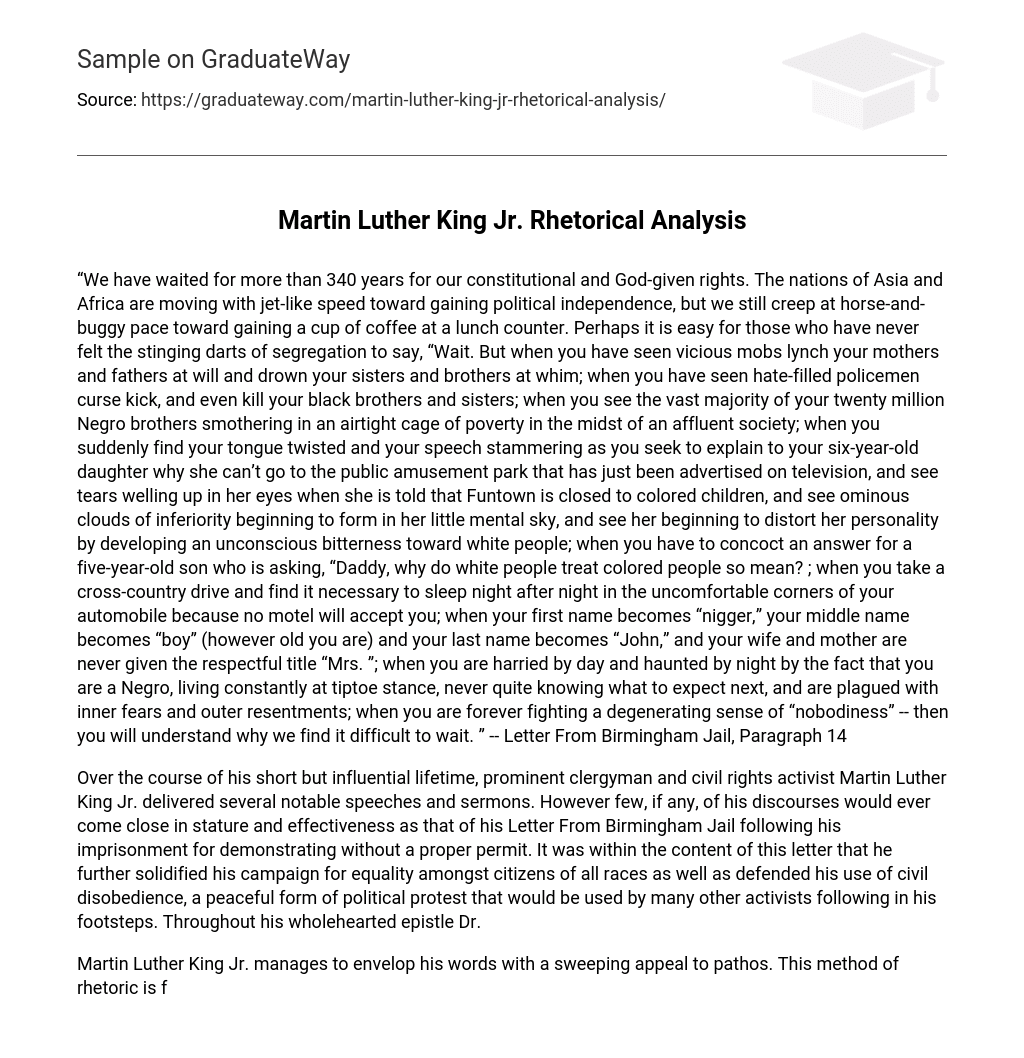“We have waited for more than 340 years for our constitutional and God-given rights. The nations of Asia and Africa are moving with jet-like speed toward gaining political independence, but we still creep at horse-and-buggy pace toward gaining a cup of coffee at a lunch counter. Perhaps it is easy for those who have never felt the stinging darts of segregation to say, “Wait. But when you have seen vicious mobs lynch your mothers and fathers at will and drown your sisters and brothers at whim; when you have seen hate-filled policemen curse kick, and even kill your black brothers and sisters; when you see the vast majority of your twenty million Negro brothers smothering in an airtight cage of poverty in the midst of an affluent society; when you suddenly find your tongue twisted and your speech stammering as you seek to explain to your six-year-old daughter why she can’t go to the public amusement park that has just been advertised on television, and see tears welling up in her eyes when she is told that Funtown is closed to colored children, and see ominous clouds of inferiority beginning to form in her little mental sky, and see her beginning to distort her personality by developing an unconscious bitterness toward white people; when you have to concoct an answer for a five-year-old son who is asking, “Daddy, why do white people treat colored people so mean? ; when you take a cross-country drive and find it necessary to sleep night after night in the uncomfortable corners of your automobile because no motel will accept you; when your first name becomes “nigger,” your middle name becomes “boy” (however old you are) and your last name becomes “John,” and your wife and mother are never given the respectful title “Mrs. ”; when you are harried by day and haunted by night by the fact that you are a Negro, living constantly at tiptoe stance, never quite knowing what to expect next, and are plagued with inner fears and outer resentments; when you are forever fighting a degenerating sense of “nobodiness” — then you will understand why we find it difficult to wait. ” — Letter From Birmingham Jail, Paragraph 14
Over the course of his short but influential lifetime, prominent clergyman and civil rights activist Martin Luther King Jr. delivered several notable speeches and sermons. However few, if any, of his discourses would ever come close in stature and effectiveness as that of his Letter From Birmingham Jail following his imprisonment for demonstrating without a proper permit. It was within the content of this letter that he further solidified his campaign for equality amongst citizens of all races as well as defended his use of civil disobedience, a peaceful form of political protest that would be used by many other activists following in his footsteps. Throughout his wholehearted epistle Dr.
Martin Luther King Jr. manages to envelop his words with a sweeping appeal to pathos. This method of rhetoric is further enhanced by his inclusion of juxtapositions such as: “The nations of Asia and Africa are moving with jet-like speed toward gaining political independence, but we still creep at horse-and-buggy pace toward gaining a cup of coffee at a lunch counter. ” In this specific example the reverend infers a comparison between the young countries of two prodigious continents, who are reaching levels of sovereignty at an extremely rapid pace, and that of a simple daily praxis denied to the people of color inhabiting a developed country such as ours.
The use of such a rhetorical device amplifies the need and desperation of the clergyman’s fight for equality by displaying the astonishing accomplishments of spurting nations compared to the pathetic shortcomings, in the face of high expectations, in the economically thriving country we call home. However as a great wordsmith the Noble Peace Prize winner did not simply stop there. Instead, he continued by enriching his missive with the utilization of other rhetorical schemes such as that of parallelism. In fact, the better part of his fourteenth paragraph is dedicated to the application of parallel sentence structures, as is apparent in: “when you have seen vicious mobs lynch your mothers and fathers at will and drown your sisters and brothers at whim; when you have seen hate-filled policemen curse kick, and even kill your black brothers and sisters… His use of such syntax helps to add emphasis to his appeal to pathos by starting each phrase with “when you” and in turn, setting in to motion a chain of explicitly horrific experiences. All in all, Dr. Martin Luther King Jr. ’s Letter From Birmingham Jail has often been revered, along with other acclaimed texts such as President Kennedy’s inaugural address, as one of the most well-written pieces of rhetorical writing by man. Such high praise is easily reenforced through his use of numerous tropes and schemes such as juxtaposition, parallelism, periodic sentence, appeal to pathos, etc. By doing so he gives hope to the cause of equality for all and offers a new era of hope against discrimination, one which would continue to thrive even after his heartless assassination.





